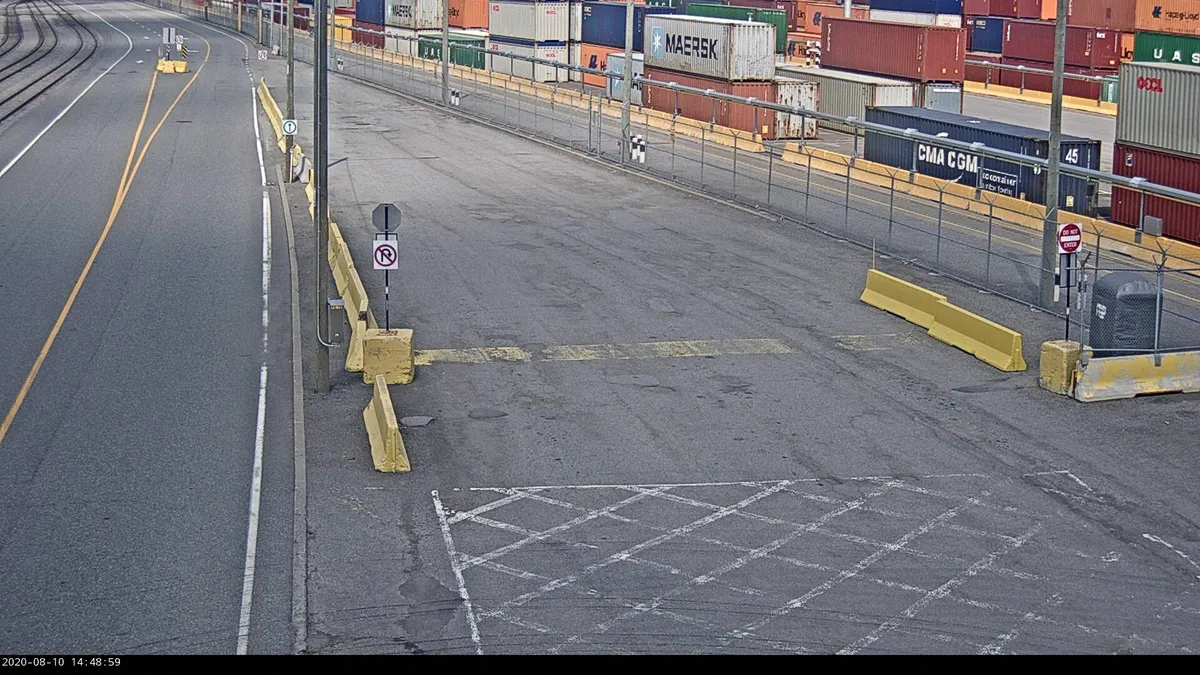UPDATE: Aug. 24, 2020: The Longshoremen Union and the Maritime Employers Association reached an agreement Friday, ending the 11-day strike, according to an announcement from the Montreal Port Authority. Normal operations were able to resume at all port facilities on Sunday at 7 a.m.
The association and union have agreed to a seven-month truce, the port said, during which negotiations will continue, and port operations will be maintained in full.
Dive Brief:
- Montreal Gateway Terminals Partnership has closed all terminal operations, including trucking, until further notice because of a strike at the Port of Montreal, according to a client advisory from C.H. Robinson.
- The longshore workers' union, part of the Canadian Union of Public Employees, began an indefinite strike at the Port of Montreal at 7 a.m. Monday. The Quebec location is Canada's second-largest port, according to CBC News. The port employs about 1,100 longshore workers. In a Friday statement, the Montreal Port Authority warned "a prolonged stoppage in port operations has major repercussions for Canadian businesses that depend on international trade and, ultimately, for the supply of goods and services to the public." Medical supplies will be allowed to move through the port, the union said.
- The strike follows a series of three smaller strikes that began July 2, the MPA said. Unions have been critical of port cuts in overtime, nighttime and weekend pay.
Dive Insight:
The Port of Montreal has been a growing part of Canada's trucking network, winning a $28 million grant last August to reduce congestion, wait times and bottlenecks for trucks. The port saw 1.7 million containers arrive in 2018, a 9% increase in container arrivals over 2017, according to Patrick Turcotte, the former chair of the Quebec Trucking Association.
Now the Montreal port strike has made potentially costly effects on freight, and that impact could filter through to U.S. and Canadian consumers, the Retail Council of Canada warned. Ocean carriers, such as Maersk and OOCL, are diverting some ships to ports in Halifax, Nova Scotia, and St. John, New Brunswick. Halifax is Canada's fourth-largest port and is competitive with other North American ports, with its location that is one day closer to the Suez Canal, according to the Association of Canadian Port Authorities.
"A strike with no time limit will aggravate the impact already hitting the Port of Montreal, which is the driving force behind an ecosystem of 6,300 transport businesses and the source of 19,000 direct, indirect and induced jobs," port authority officials said in a Friday news statement.
The delays could last several months for all port operations and greater Montreal's supply chain, which serves Quebec Ontario and the U.S. Midwest, the port authority said. The port authority said work stoppages could cause long delays in handling goods for Canadian companies, especially exporters. Stoppages could also force export companies to lease warehouses or cause international shipping lines to reroute vessels, sometimes to competing U.S. ports, resulting in higher costs for shippers.
On Monday, a number of Canadian organizations, including the Retail Council of Canada, the Canadian Chamber of Commerce, the Canadian Vehicle Manufacturers' Association, the Canadian Federation of Independent Business, and Canadian Manufacturers & Exporters, called on the Minister of Labour to bring a resolution of the negotiations between the longshore workers and the port to ensure the continuation of port activities.
"Canada is caught in the middle of a devastating and unprecedented economic slowdown because of the COVID-19 pandemic," said Diane J. Brisebois, president and CEO of the Retail Council of Canada. "Labour action at the Port of Montreal will have a direct and significant impact on the operations of thousands of companies and their employees. Tens of thousands of workers whose livelihoods depend on the Port of Montreal will be at risk of losing their jobs. Labour action will strain already weakened supply chains."
The unions went on strike because of cut in overtime, and because of a change in premium pay for nights and weekends, according to CTV.













